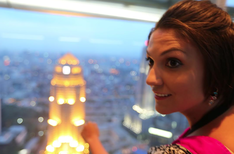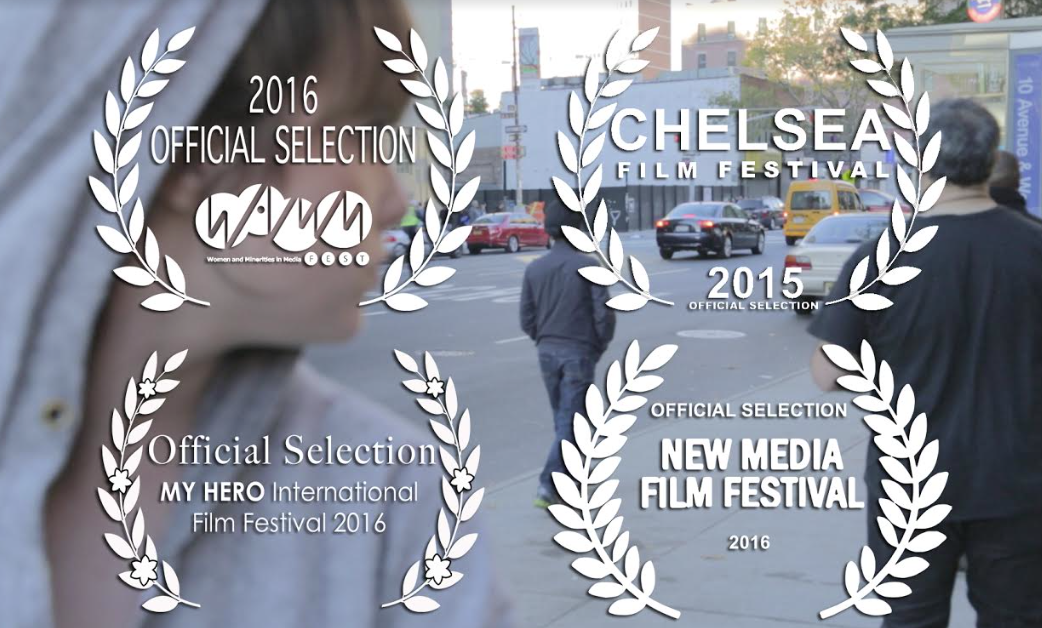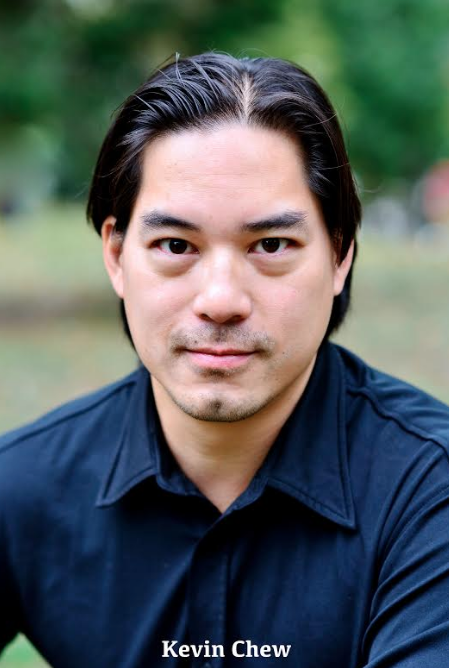
This is our final segment for this project and, as our finale interview, I'm delighted to be able to share the insights of director Katherine Filaseta. It was a privilege being able to share the interviews of all these tremendous artists and I wish we could have interviewed many more! Thank you to all who applied and please feel free always to share your works and ideas for collaboration and connection on the Film Lab's Facebook pages at: Film Lab, AAFL TV and 72 Hour Shootout. Now, back to Katherine:
1. Please tell us a little about yourself, your background and your work.
My name is Katherine Filaseta, and I am currently a director working in NYC. I really have no formal filmmaking background; my education was all over the place, from music to biology to international studies to acting, and what I think drew me to filmmaking was how it is probably the only place where all of these interests I have can smoothly overlap. That’s really what I enjoy doing and pride myself on with my work, as well: combining music, dance, camerawork, and other storytelling methods to tell a single, cohesive story.
2. What are the most challenging and most rewarding aspects of your work and why?
The hardest part about being a filmmaker for me, personally, is convincing myself that this is a valid way to live my life. I definitely come from a supportive family that offered me a lot of privilege, but in such a way that they encouraged me to go into academia or medical school and at this point would be happiest if I took really any 9 to 5 job that comes with a W2 and health insurance. On top of that, I never grew up seeing women in the film industry on TV or in other media. So I have a lot of self-doubt because of this and sometimes feel like I’m trying to do the impossible, but at the same time just the fact of knowing that I am doing what I love with my life despite society’s invalidation is a huge reward. That, and hearing about hatred towards my work. I think within art, the more extreme feelings you can generate the more you’ve succeeded, even if those feelings are sometimes negative, so it always makes me happy when I see total strangers complaining about what I’ve made - it means they care enough to complain!
3. How do race and/or gender and/or diversity play into your work?
In my work, emotional truth is the most important thing to me, and as a woman, I just naturally find it easiest to be truthful when the story I’m telling centers around women. It’s also tough, though, because as a straight cis able-bodied white woman, I feel an obligation to use the privilege I do have to help tell stories that are being told even less frequently than mine. So I’ve recently been working within stories that are truly mine with characters who are more intersectional, and then adding authenticity by working with diverse writers and actors (and other crew members when possible) who contribute their truths to my stories.
I also have very personal, although not first-hand, experience with things like inter-cultural adoption and disability in my family, and I struggle to find the ethically right way for me, an able-bodied white woman, to tell these other stories that are still very much mine, and that I know my sisters aren’t going to write/direct for themselves. It’s been tough figuring out the “right thing” to do as a minority storyteller who, compared to so many people, holds a lot of privilege. I don’t know that I’ll ever really figure out how to perfectly balance that in my work, but I am trying.
4. What are the best and worst things that have happened to you, within the context of race or gender issues in entertainment, and what did you learn from them?
Along the lines of what I was talking about in the last question, I had a pretty negative situation recently when I was trying to source other people’s stories for a short script I was writing that was set in India, a place I am in no way from, even though I have spent a lot of time studying and living there. Because of this, I used social media to ask for stories from people who were from India, and received a lot of backlash along the lines of “why should YOU tell our stories?” Of course, because it’s the internet, it quickly got much nastier than that, and it put me in a difficult place because I was asking for these stories with the intention of gaining authenticity, and in the end it felt like I ended up just making things worse. I definitely am handling this particular situation the wrong way, because I’ve put the script on pause ever since then, but I guess what I have taken from the situation is just that it’s impossible to please everyone, especially in situations that involve things that people are as sensitive about as their own culture/race/gender. Of course I always will strive to do what is the most truthful and ethical in all of these situations, but it’s still probably going to make people upset, and it’s important to understand as soon as possible that this will regularly be a side effect, so that I can engage in those conversations while not losing confidence in myself and the stories I want to tell.
6. As you know, AAFL TV promotes works that seek to effectuate positive and constructive social change through the medium of film. Do you think filmmakers have an obligation to create diverse and/or morally and socially conscious content? Why or why not?
I don’t think it’s an obligation of all filmmakers to create diverse/moral/socially conscious content, per se. Everyone’s story is valid, and there are people out there who just are not going to be able to tell stories that are both truthful and socially conscious. I personally feel that obligation, but I don’t think art that doesn’t is invalid as art. However, I do think that if someone makes content that isn’t socially aware, they need to be open to conversations and criticism about it.
7. What are the most sage words of advice you can offer to new and emerging filmmakers?
This was said by the brilliant Victoria Alonso at the NYWIFT Muse Awards 2015 (the full speech is also something all women in the industry should watch): “The reason why we’re not there is because we walk in with fear because we don’t have everything together. Men walk in, have 50% of it, and they own a seat at the table. We walk in with 99.7%, and we doubt that .3%. Stop it!”
I know that advice is specifically directed towards women, but it’s the best words of advice that I’ve ever heard or followed. If we want to succeed as a group, it’s important to start by walking into a room and owning it as if we were all white men. Before we even get to a point of calling ourselves successful, we all know so much - so we should give ourselves credit for what we do know.
9. What is the single most fun moment you've experienced in the entertainment industry?
Going to film festivals as a filmmaker is always fun. When you’re in front of the camera you have people constantly talking about how beautiful you are (both in real life and through the camera), but when you’re behind the scenes, life is generally much less glamorous - so it is always fun to go to a festival and feel glamorous for a change. It’s also just nice to relax with a few drinks while you watch those first crowds of people appreciating the product of all your hard work.
10. What is the single most obnoxious moment you've experienced in the entertainment industry?
Honestly, the most obnoxious things I experienced were in “film school” (in quotations because it was just a very short three-month evenings-only class). Maybe some of my peers were more non-committal because it was a short-term class, but on my first ever directing project, I had an older man in my group show up five hours late to set with no communication that he was running later than 15 minutes. As soon as he showed up, he started giving creative input and generally starting all sort of conflict trying to take control of my project, which was both irritating in itself and felt like it was one of those situations where he thought even his five-hours-late opinions would always be more valid than the woman’s pre-prepared ones. Since I’ve been out of school, though, I’ve been involved with organizations like New York Women in Film & Television and Asian American Film Labs; by being a part of these groups, I’ve always had the opportunity to choose to work with people who realize that we’re all struggling to work towards the same goal, and as such, I’ve had very few obnoxious experiences.
11. What lies ahead for you in terms of the entertainment biz?
I don’t necessarily have a five-year plan, but I should at least have some fun projects coming out in the next year or so. I’m currently in the final stages of post-production for a horror short; my first experience even consuming horror as a genre was in preparation for this film, so it was a fun experiment for me. After that, I’m in pre-production on a script for a short film that I’m directing, about an Indian-American girl graduating from college and grappling with her goals for herself vs her parents’ dreams for her, which will include some Bollywood-esque storytelling aspects that I’m super excited to play with. Then I’m also finishing up my own screenplay, my first serial script, about all the crazy behind-the-scenes drama and unique characters that go into making even just one night of an international film festival appear to run smoothly.
12. What does the phrase "Ethical Is Beautiful Be Beautiful" mean to you and your work, if anything?
I think within art, to be ethical you just have to be truthful. What has been true about my life is that it has been a liberal bubble filled with diverse people, but if what is true about your life is that everyone is a rich white man wearing a “Make America Great Again” hat, that is still ethical and can still make a really interesting and beautiful story - and is still even a story that I might be interested in directing. Scripts from either bubble that rely on offensive jokes, cheap stereotypes, and/or one-dimensional characters whose whole personality is based on their appearance, on the other hand, would fall in the realm of ugly and unethical. To me, being ethical doesn’t necessarily have to mean I am telling a story that has a moral objective of any kind; it just means making sure my stories include a variety of three-dimensional characters that real people can actually relate to.






 RSS Feed
RSS Feed
